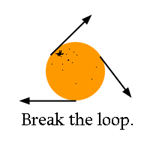

 | Tangentium |
March '04: Menu
All material on this site remains © the original authors: please see our submission guidelines for more information. If no author is shown material is © Drew Whitworth. For any reproduction beyond fair dealing, permission must be sought: e-mail drew@comp.leeds.ac.uk. ISSN number: 1746-4757 |
Anarchism, Activism and IT: Links and other resourcesWith a subject like this, a list of links and resources will undoubtedly have a subjective feel. There is no suggestion that what is presented here is "the best" of all such lists; rather, it is a list compiled from the references located in this month's essays and some other sites which we've had contact with. Additions to the list are welcome, although as ever we're trying to emphasise quality, not quantity. AnarchismProbably the best anarchist resource online is http://flag.blackened.net, which presents complete versions of some of the most important anarchist texts, a discussion forum, a FAQ, links to other sites, and many other helpful resources. Highly recommended for anyone seriously interested in anarchism. The Institute for Anarchist Studies act mainly as a grant-giving organisation for radical writers - the products of which can be viewed on this site. Spunk is another good online library and resource for anarchism: as is (are?) the Anarchy Archives. Anarchism and ITAn essay from the journal First Monday: "Anarchism Triumphant: Free Software and the Death of Copyright". Useful background information for some of the positions presented in this month's Tangentium. The frequency with which this article is cited, incidentally, seems to indicate the dearth of real analysis of this issue. Most of the time, whenever "anarchy" comes up with reference to IT, this is merely a reference to the supposed (but fallacious) "anarchy" that is the Internet, or a highly "libertarian" or "radical corporatist" position epitomised by Ian Angell's book, The New Barbarians; for an insight into this mindset, try this article from Fast Company magazine. Sam William's biography of Richard Stallman is a must-read for anyone interested in free software and the philosophical and political motivations behind Stallman's crusade. Credit must be given, too, to the writer, publisher and Stallman himself for letting this book be freely accessible online, in the true spirit of the campaign: would that other "anti-establishment" writers would recognise the benefits which come from doing this, not just the (financial) losses. http://www.gnu.org/ is the site of both GNU/Linux and the Free Software Foundation. Activism and ITThe dividing lines between this and the previous section are, perhaps obviously, blurry: but we've tried to list here those sites and organisations which are more interested in offering practical solutions than philosophical background (we believe both reinforce each other, incidentally). As a starting point, try the Electro Hippies web site; although this group have now "disbanded" so the site is no longer current, it remains a useful resource. Or, try the Politech archive. Still very much alive is the Hacklabs movement, including the example mentioned by Winstanley in his essay, the Freedom Press Media Hacklab in London. These are excellent examples of practical ways to reconcile activism and IT. Many other groups do IT work as part of a wider portfolio of activism, such as Seeds for Change in Lancaster. Others offer skill-sharing workshops or online tutorials, such as Groundswell in London: this page includes some free computer training courses. Recycling computers is an important task, firstly because this may enable low-income or otherwise disadvantaged groups or individuals to gain access to the technology -- secondly because of the environmental impact of computers thanks both to the technologies involved and the high turnover rate. An example of such a service is Sava-Comp: though there will be others in your local area. Edukalibre is a project that attempts to turn back the increasing corporatisation of academia by creating "create an open-source learning environment which fosters copyright free content, collaborative courseware development and a social-constructivist pedagogy". | |